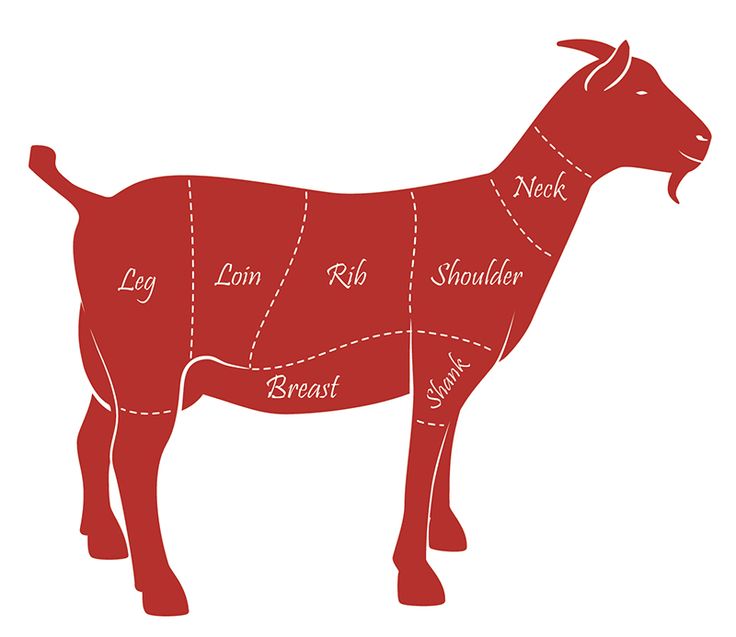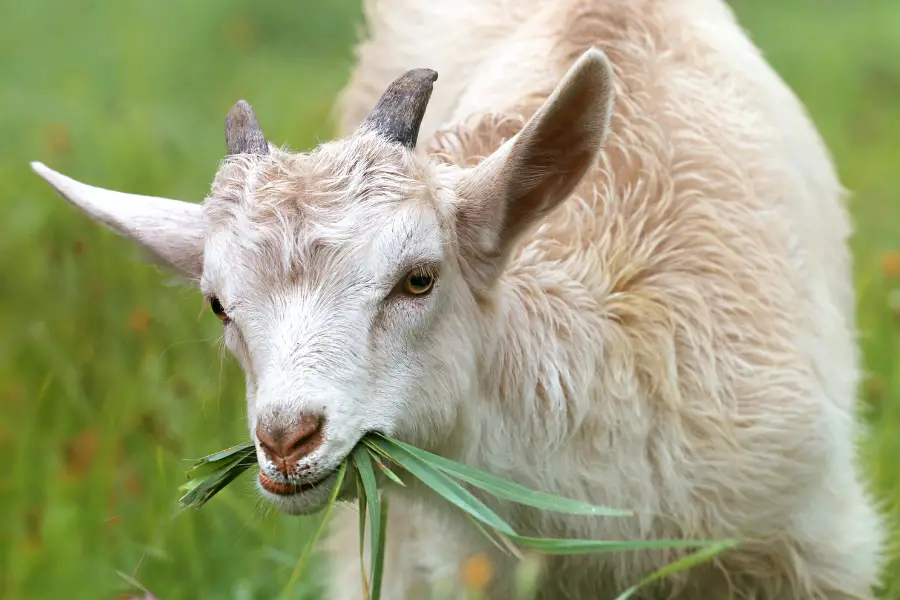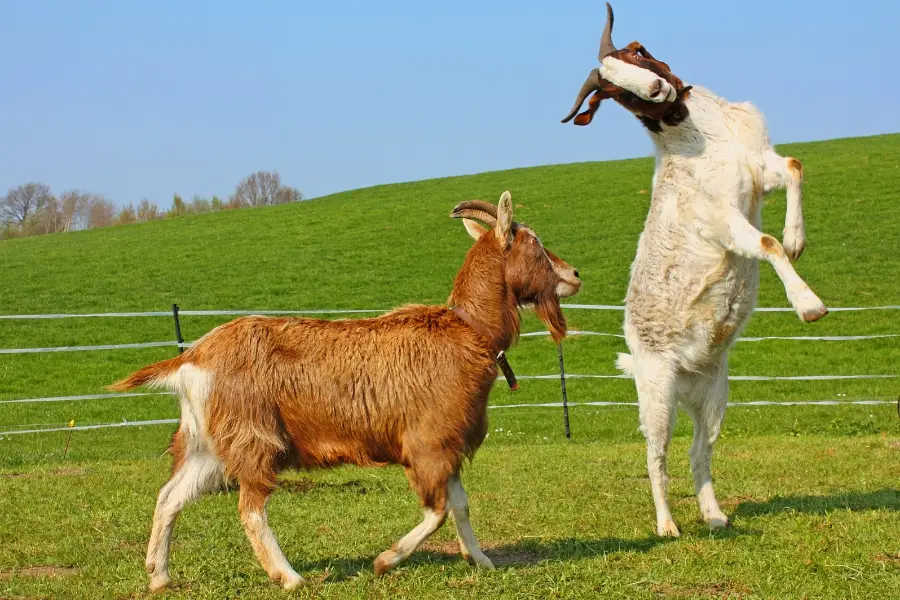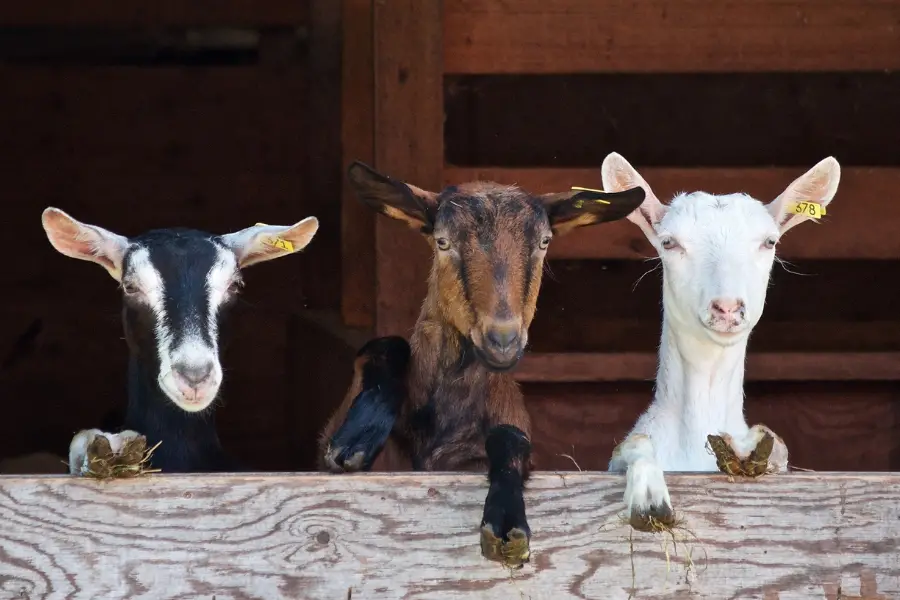
Interested in raising Pygmy goats? In this complete guide we walk you through everything you need to know: where they come from, what they can be used for, where to buy them, and much more!
The Pygmy Goat is a small, hardy, adaptable goat breed that is increasingly popular in the United States.
Their small size and good nature make them attractive dairy goats, where they require less space and feed than larger goats, and are suitable for smaller farms in urban and suburban settings. They are also frequently kept as pets, simply for the enjoyment of their companionship.
Table of contents
- Pygmy Goat Origin
- Pygmy Goat Uses
- Pygmy Goat Characteristics
- Breeding Pygmy Goats
- Pygmy Goat Price
- Pygmy Goat Breeders
- Pygmy Goat Farming
- What are pygmy goats used for?
- Pygmy goats care: Top tips
- Pygmy goats for sale: Where can I buy pygmy goats in the USA?
- Pygmy goat associations: What are the major pygmy goat associations in the USA?
- Video: Pygmy Goats FAQ’s / Ask A Vet with Dr. Jyl!
- Are Pygmy Goats Loud?
Pygmy Goat Origin
The modern Pygmy Goat is often called the African Pygmy Goat, owing to their origins in central and west Africa. African breeders developed these goats to be compact and resourceful, and able to survive on limited high-quality forage in a variety of climate conditions. Descended from West African and Nigerian Dwarf goats, pygmy were first imported into Europe through Britain, and eventually to the United States.
They were originally imported as a curiosity, for zoos and shows, and remain extremely popular fixtures in petting zoos across the country due to their friendly nature. Many Pygmy goats were adopted by private breeders in the 1950s, who took an interest in cultivating these cute little goats as pets and companions.
They are too small to be a very productive meat goat, and don’t produce as much milk as other breeds per lactation. However, their milk has a very high butterfat content, which makes them desirable dairy goats for soaps, creams, and other goat milk products that require a high fat content.
Pygmy Goat Uses
The most popular use for pygmy goats is as pets and as companion animals. They are cute, adaptable, friendly, and easy to care for.
Their small size makes them extremely attractive 4H project animals, because children are not intimidated by these little goats.
They are also frequently kept as good-natured companions for grazing animals, where they provide calming friendship for other herd animals. Their delicious milk makes them a welcome addition in a variety of small farming operations.
Pygmy Goat Characteristics
Appearance
Pygmy goats have extremely variable coats, and have 7 breed standard approved colors. Their eyes come only in brown.
Size
Does weigh 50-75 pounds, and bucks weigh 60-85 pounds. Wither height ranges from 16 to 23 inches.
Production
Pygmy does produce 1-2 quarts of milk per day when lactating, and their milk ranges from 4.5% to a staggering 11% butterfat. However, they produce milk for only a short 120-180 days.
Disposition
Pygmy goats are known for being friendly, curious, and outgoing. They seek out and enjoy interacting with people, and will respond readily to vocal calls. While bucks in particular can have the stubborn streak that goats are famous for, Pygmy goats are an excellent companion animal.
Raising Pygmy Goats
Pygmy goats are adaptable to a variety of weather conditions and are a low-maintenance animal.
Known to be sociable and friendly, their small size makes them easier to care for than larger goat breeds, because they require less space and less feed.

Pygmy goat social needs.
Like all goats, Pygmies are herd animals and will not be healthy or happy when kept alone. If you are keeping a Pygmy as a pet, they will often not do well in an environment where they are alone for extended periods.
Keeping them with other goats, or even with grazing animals or dogs, will help satisfy the social needs of this outgoing little animal.
Pygmy goat medical needs.
Like all goats, Pygmy need periodic hoof trimming and deworming, depending on their diet and lifestyle. Fortunately, their small size makes handling them easy. Make sure you have access to a veterinarian who is familiar with the needs of goats.
Pygmy Goat Food Needs.

Water. Goats should always have access to fresh, clean water. Remember that your pygmy goats will need more water than usual in hot weather or when lactating.

Forage and feed. Pygmy will happily browse on shrubs, weeds, herbs, and leaves. Allowing them freedom of pasture also gives them the exercise they need to stay healthy and prevent health problems.
Depending on the size of your pasture, the variety of plants available, and the season, alfalfa hay can and should be offered for free feeding. Purchase very high-quality hay for the healthiest goats and best quality milk.
Alfalfa hay is high in calcium, which is essential when goats are kidding and producing milk. Alfalfa hay can be expensive, so some people supplement other high-quality hay with alfalfa pellets instead.
Grain is a desirable source of extra nutrition when a goat is producing milk, but is not strictly necessary.
Supplements. Depending on the plants in your pasture, local soil composition, and nutritional composition of your hay, it is likely that your goats will need mineral supplements. If you are providing high-quality food, they may only require small amounts of trace minerals.
When free-fed, goats will only eat as much mineral supplements as they need. Use a mineral supplement designed for goats or cattle, and avoid supplements designed for sheep, because goats and cows require copper, which is toxic to sheep. You can also feed your Pygmy goats fruit and vegetable scraps from the kitchen to add variety to their diet.
Pygmy goat enclosure needs.
Like all goats, Pygmies are agile and ready jumpers, and require ample space to roam and exercise to prevent unnecessary wear and tear on your fencing. However, their small size limits how high they can jump, and reduces the potential for damaging your fences and enclosures.
Remember that fences not only keep goats in, but should keep predators out, and Pygmies are especially susceptible to predation, depending on your local wildlife.
Even some stray dogs can pose a threat to Pygmies. Fences should be about 4 feet high since Pygmy goats can’t jump higher than that.
Goats will lean, stand, rub, and chew on fencing, particularly if they have smaller pasture, or if there seems to be attractive forage on the other side, so posts should be no further than 8 feet apart.
The best way to secure your Pygmy goats is with a woven wire fence with 2×4-inch openings too small for adults to put their heads through; woven wire is strong enough to withstand the chewing, leaning, and standing that the fence will endure. Woven/goat wire can be purchased in rolls that are already 4 feet high.
Pygmy goat shelter needs.

All goats need shelter at night and in poor weather. Situate your shelter well away from your fence, so that goats aren’t able to jump from the roof of their shelter over the fence, and avoid situating the shelter on low ground that would accumulate rain.
At minimum, the shelter can simply be a roof and three sides, so that goats can get out of bad weather. It is better to have a dry dirt floor than a wood one; wood flooring can get slippery with mud or manure, and potentially injure a goat or cause foot problems.
Does will need additional shelter and protection when they have kidded, and to be separate from the herd while the kids are still small.
Breeding Pygmy Goats

Pygmy does can come into heat when they are as young as 2 months, but breeding them that early should be avoided.
They are polyestrous, and will come into heat when they are exposed to a male, so it’s a good idea to keep young does away from bucks until you are ready for them to breed.
They are prolific breeders, and does can give birth to 2-4 kids every 9-12 months.
When a doe is coming into heat, she will generally show signs with signature behaviors, such as:
- Tail flagging
- Signs of mucous or discharge
- Swollen rear end
- More pronounced or unusual yelling or bleating
- If she is exposed to a buck, she will usually show greater interest in him and seek him out
Unlike dairy goats that will come into heat annually, and produce milk for 1-2 years, Pygmy goats produce milk for only a relatively short 3-6 month period of time. This makes their polyestrous nature favorable.
If you want a steady supply of delicious, high-quality goat milk, you will need several does, and to time their breeding schedule so that you will always have a doe producing milk. At a minimum, this means four does, breeding a different one each quarter, so that you can have 1-2 quarts of goat milk a day throughout the year.
This presents the challenge that all goat farmers have: keeping a buck so that you can breed your goats when desired, but isolating him from the does so that they don’t breed to early, or more than once.
Even relatively small Pygmy bucks can be quite determined when they want to access a receptive doe, so their enclosure needs to be very sturdy. And even bucks that need to be separated from the herd still have social needs, and should be kept with other animals or a wether for company.
If you choose to keep a buck, it is best to not have him share a fence with the does. Goats are resourceful, and have been known to breed through fences. Create an enclosure for the buck, with a clear area of 15 or more feet between it and the enclosure for the does.
This buffer zone will not only prevent unwanted breeding through the shared fence, but it will also discourage him from attacking the fence and putting undue strain on it.
As an alternative, you may find a neighbor with a buck and arrange periodic “dates” for your does when you are ready for them to come into season and to breed. This is a popular method for keeping constant milk production, while avoiding some of the expense and challenge of owning your own buck.
Pygmy does are famous for having kidding problems, due to the small size of their pelvis, and will need to be watched closely as a pregnancy nears its term. It is best to have a veterinarian available to assist if necessary, and be familiar with the signs of a difficult kidding and how best to intervene and help the doe.
Most does experiencing a normal birthing will have a kid within an hour of beginning labor. If your doe has been pushing for an hour and not yet kidded, notify your veterinarian and have them on standby. If she still has not given birth after 2 hours of pushing, it is necessary to intervene, and potentially save the life of both mother and kid(s).
Pygmy wethers make excellent and popular pets, and this popularity as a pet helps to reduce some of the stress of figuring out what do to with the unneeded male kids born several times a year. It is also a good source of additional income from a pygmy goat farm.
Pygmy Goat Price

Pygmy goat prices vary widely depending on whether you are happy with an unregistered animal to keep as a pet ($40-$50), or want a pedigreed Pygmy to start breeding of your own for sale and profit ($150 – $300).
Pygmy Goat Breeders

Because Pygmies are both pets and livestock, there are a variety of breeders who specialize in different purposes.
Many popular Pygmy breeders can simply be found on Facebook, and there are excellent resources available through the National Pygmy Goat Association.
Be wary of people offering pet goats through public bulletin boards like Craigslist or Facebook Marketplace.
Make sure you visit the goat on site before bringing it home, verifying that the goat is healthy and parasite free, and that its living conditions are clean and healthy.
Bringing home a sick goat not only can lead to extensive expensive veterinary care, and potentially the loss of the animal, but can put your other animals in health jeopardy as well. It’s best to always buy from a breeder with a good reputation, and inspect the goat thoroughly before you agree to buy it.
Pygmy Goat Farming

The Pygmy goat is also referred to as the African pygmy and the miniature goat. They’re a miniature breed of goat that can easily adapt to their environment, despite different climates.
What are pygmy goats used for?
Pygmy goats are sturdy, little animals that have the friendliest of personalities. Their small stature and good nature make them incredible show animals. They are also a perfect breed for goat yoga. They weigh up to 65 pounds and though they’re small and cute, pygmy goats can hold their own in milk production and breeding.
Pygmy goats as pets
Pygmy goats are known to be very cute, friendly, and come in a variety of different colors. If you’re looking to house any as pets, there are a few things you should know about them, as they do require a different level of care than your average household animal.
- Each pygmy is different, and their attitudes are different as well. Though most are friendly, some may be a little standoffish at first.
- Pygmy goats are very playful.
- As a pet, pygmy’s require fresh, clean water and plenty of nutritious foods.
- A small, strong, ventilated structure is a good place to keep your pygmy goat.

Pygmy goats for meat

If you’re setting up your goat farm to be a source of meat, you need to know that there are show goats, and then there are meat goats. They’re raised very differently, so when you’re selecting your breed, make sure you know what type of goat you’re getting.
Though they’re small in size, pygmy goat meat sells because it’s so compact. Also, they mate out of season and breed every 9 to 12 months. This means that this particular breed produces more offspring, a.ka., more meat.
Pygmy goats for milk
At the peak of their lactation, pygmy goats can produce up to ⅔ of a gallon of milk per day. Their milk is very sweet and delicious. Pygmy goat milk is best maintained when it’s kept in cold storage.
Pygmy goat milk is rich in calcium, potassium, and lower in sodium than other breeds.

Raising pygmy goats: Pros and Cons
Like any animal, pygmy goats come with a shortlist of pros and cons. Now, depending on what you’re using the pygmy for, these lists may or may not sway your decision to start a farm.
- They’re energetic and active creatures. You’ll never have a dull moment with them.
- Pygmy goats are intelligent and loyal, which makes them ideal housepets.
- They’re one of the few goat breeds that can reproduce outside of their mating season.
- Pygmy goats adapt easily to their environment.
- They require a lot of open space to run around and play.
- Pygmy goats are considered prey among other animals, so sometimes they might have trouble getting along with your other pets.
Pygmy goats care: Top tips
Keep in mind the following tips when deciding if you want to add pygmy goats to your life.
- Because they’re so tiny, pygmy goats don’t need as much space as larger breeds. However, they do get bored easily, so they’ll need a space where they can run around and use their minds.
- Pygmy goats should be kept in a ventilated, sturdy space built for their size.
- They need a good amount of freshwater daily to keep them healthy. Also, a good amount of alfalfa hay mix/grass, molasses-free grain, and trace mineral salt will ensure that your pygmy gets all the nutrients they need.
- If you want to breed your pygmy goat, the ideal time to wait is 18 months after they’re born.
Pygmy goats for sale: Where can I buy pygmy goats in the USA?

There are two types of pygmy goats that are sold in the US: Nigerian Dwarf Goats and African Pygmy Goats. Goats can range anywhere from $50 to $300 depending on various factors including sex, weight, size, age, and temper. There are additional costs that may need to be covered to make sure your house/farm is ready to take on this new animal.
There are pygmy farms and breeders all over America who house a reasonable selection of pygmy goats. If you want to see who sells what, contact your local zoo, pet store, or animal farm to see what they have to offer.
Pygmy goat associations: What are the major pygmy goat associations in the USA?
- The National Pygmy Goat Association
- The Livestock Conservancy
- The American Nigerian Dwarf Dairy Association
Video: Pygmy Goats FAQ’s / Ask A Vet with Dr. Jyl!
Are Pygmy Goats Loud?
Indeed they are! They are very “talkative” and will scream like a human. You need to be in a pet friendly environment to own goats!





4 responses to “Raising Pygmy Goats: Ultimate Guide for Beginners”
I live in Vancouver Island. How much should I pay for a pygmy goat? Just an average
Can male does live in the same area?
My doe just had her 1st kid. It was a male. When he gets mature can he live with other males or should I sell him?
Prices vary ..depends on whether its registered or if you just want a pet. I bought my 1st 2 for about 300.00. I’m planning on farming.